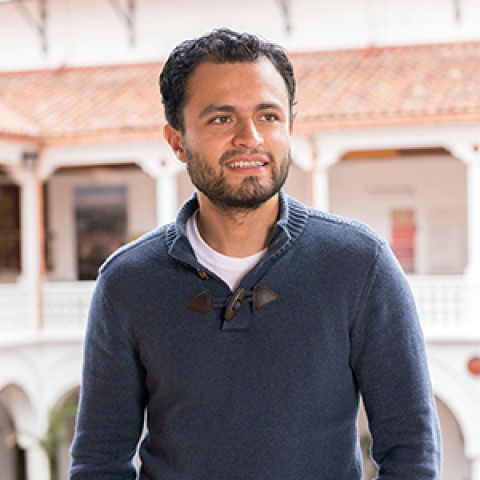Smart Manufacturing
Fechas
Registro
The Smart Manufacturing course is designed for tactical and strategic personnel interested in delving into the world of Advanced Manufacturing. This innovative approach seeks to apply information and communication technologies (ICT) to enhance the efficiency, flexibility, and sustainability of industrial manufacturing processes.
During the course, participants will be introduced to the key technologies used in Smart Manufacturing:
- Sensors: Participants will learn how sensors collect real-time data, enabling them to identify problems, improve product quality, and optimize resources in the production chain.
- Artificial Intelligence (AI): They will discover how AI analyzes data collected by sensors and makes real-time decisions, driving the efficiency and productivity of manufacturing processes.
- Robotics: They will explore the fundamental role that robots play in manufacturing, performing dangerous or repetitive tasks to enhance the safety and quality of the final product.
Benefits of Smart Manufacturing for Manufacturing Companies:
The course will highlight the benefits that Smart Manufacturing offers to companies in the manufacturing sector, such as:
- Improved Efficiency: Implementing Smart Manufacturing strategies can lead to process optimization, reducing costs and increasing operational efficiency.
- Improved Product Quality: Participants will understand how the use of advanced technologies enhances the quality of products, which directly impacts customer satisfaction and the competitiveness of the company.
- Improved Flexibility: They will learn how Smart Manufacturing increases production flexibility, allowing for agile adaptation to market demand changes.
- Improved Sustainability: It will explore how Smart Manufacturing contributes to environmental sustainability, reducing the negative impact of production on the environment.
The course will be conducted through a combination of theoretical classes, case studies, practical exercises, and debates, fostering interaction among participants and expert facilitators in the field of Smart Manufacturing.
Online
Total course duration of 30 academic hours spread over 8 weeks.
24 hours in real-time virtual mode with the teacher via Zoom.
6 hours of student self-study activities.
First Monday 6:30 PM - 7:30 PM
Tuesday and Thursday from 6:00 PM to 8:00 PM
Saturday from 9:00 AM to 1:00 PM
Early Payment: $420 (NOV 1)
General Public: $480
Group Rate: $440
ALUMNI Rate: $450
General Description
General Objective:
Introduce students to the use of 4.0 technologies applied in the field of manufacturing, providing them with essential knowledge and basic skills to effectively understand and leverage these technologies in industrial production processes.
- Understand the fundamentals of advanced manufacturing
- Identify and describe key technologies used in advanced manufacturing:
- Analyze the benefits and advantages of advanced manufacturing
- Evaluate the challenges and obstacles of advanced manufacturing
- Design strategies to implement advanced manufacturing in a company
Learning Outcomes:
| # | Learning Outcomes | Level |
|---|---|---|
| 1 | Students will understand the fundamentals of advanced manufacturing and be able to identify the key technologies used in this approach, applying them to improve production processes. | Medium |
| 2 | Students will analyze and evaluate the benefits and challenges of advanced manufacturing, enabling them to make informed decisions for its implementation in manufacturing companies. | Medium |
| 3 | Students will be able to design strategies to gradually implement advanced manufacturing in companies, considering strategic, technological, and change management aspects. | Medium |
Note: Learning outcomes should be related to the specific objectives of each module, and the first word should be worded as an infinitive verb
Targeted at:
The potential audience for a smart manufacturing course is broad and diverse. It includes people working in the manufacturing industry, as well as those interested in learning about this trend. Students may be engineers, scientists, managers, operators, technicians, and more. In general, individuals who want to learn how Information and Communication Technologies (ICT) can be used to improve the efficiency, flexibility, and sustainability of manufacturing processes.
Graduate Profile
The graduate of the "Smart Manufacturing: 4.0 Technologies in Advanced Manufacturing" course will be a professional trained in the fundamentals and practical applications of 4.0 technologies in the field of manufacturing. They will possess a set of knowledge, skills, and competencies that will enable them to face the challenges and opportunities of Industry 4.0 in the industrial sphere.
Mode
Total duration of the course: 30 academic hours spread over 8 weeks.
- 24 hours in real-time virtual mode with the professor via Zoom
- 6 hours of autonomous student work activities
The teaching methodology of the course is based on the flexible Blended learning model and project-based learning. The professor will give lectures to their students in real-time, encouraging students to intervene with their doubts and comments. The more frequent these interventions are, the richer the collective learning will be. Sessions will focus on particular topics or specific case studies, aiming to provide students with a comprehensive understanding of the theory and its relationship with the current industry context.
In addition to this, all participants will carry out 6 hours of autonomous learning on the USFQ E-Learning platform, where they will find materials provided by the professor. They will watch videos, read short articles, participate in forums, or have brief discussions on the various topics covered in the course.
Content
Module 1 | Introduction to Advanced Manufacturing
Academic Responsible / Instructor:
Duration: 14 hours
Learning Objective: Students will understand the fundamentals of advanced manufacturing and be able to identify the key technologies used in this approach, applying them to improve production processes.
Module Content:
- Basic concepts of advanced manufacturing
- Definition of advanced manufacturing
- History of advanced manufacturing
- Trends in advanced manufacturing
- Key technologies of advanced manufacturing
- Automation
- Robotics
- Process control
- Manufacturing engineering
- Supply chain management
- Examples of how advanced manufacturing has been used to improve production processes
- Customized production
- Real-time production
- Zero-waste production
- Sustainable production
Teaching Methodology: Virtual sessions with discussion and in-class activities.
Module 2 | Benefits and Challenges of Advanced Manufacturing
Academic Responsible / Instructor: Jorge Cáceres
Duration: 8 hours
Learning Objective: Students will analyze and evaluate the benefits and challenges of advanced manufacturing, enabling them to make informed decisions for its implementation in manufacturing companies.
Module Content:
- Benefits of advanced manufacturing
- Efficiency and Quality
- Flexibility
- Challenges of advanced manufacturing
- Cost/benefit
- Resistance to change
- Evaluation of the benefits and challenges of advanced manufacturing for a specific company
- Analysis of production processes
- Identification of areas
Teaching Methodology: Virtual sessions with discussion and in-class activities.
Module 3 | Strategic Implementation of Advanced Manufacturing
Academic Responsible / Instructor: Jorge Cáceres
Duration: 8 hours
Learning Objective: Design strategies to implement advanced manufacturing gradually in companies, considering strategic, technological, and change management aspects.
Module Content:
- Strategic planning of advanced manufacturing
- Strategic vision of advanced manufacturing
- Identification of implementation objectives
- Development of an implementation plan
- Technological surveillance
- Technological surveillance for companies
- Methods of technological surveillance
- Benefits and challenges of technological surveillance
- Change management in the implementation of advanced manufacturing
- Importance of change management in the implementation of advanced manufacturing
- Challenges of change management
Teaching Methodology: Virtual sessions with discussion and in-class activities
Course Evaluation
The weighting of each component is distributed as follows:
| Category | Description | Percentage of final grade |
|---|---|---|
|
Module 1 |
In-class end-of-module activity |
25% |
|
Module 2 |
In-class end-of-module activity |
25% |
|
Module 3 |
Reflections and learnings on case study |
25% |
|
Zoom Sessions (attendance and participation) |
Attendance at scheduled sessions |
25% |
- Note: It is recommended that the number of grading components be between 4 and 5, and that the weight of a grading component does not exceed 40% of the final grade.
Schedule
Start Date: Monday, November 27, 2023
End Date: Saturday, December 16, 2023
Schedule:
- Session Duration: 2 hours with a break
- Class Days: Tuesday and Thursday from 6:00 PM to 8:00 PM
The schedule may undergo modifications of dates and content.
| Week | Month | Day | Duration (h) | Schedule | Module | Topics | Instructor | ||
|---|---|---|---|---|---|---|---|---|---|
| 1 | November | 27 | Monday | 1 | 6:30 PM to 7:30 PM | Module 1 | Session 0 | Session 0: Informational Session | Carlos Alberto Franco and Leonardo Vargas |
| 28 | Tuesday | 2 | 6:00 PM to 8:00 PM | Session 1 | Basic concepts of advanced manufacturing | ||||
| 30 | Thursday | 2 | 6:00 PM to 8:00 PM | Session 2 | (Part 1) Key technologies of advanced manufacturing | ||||
| December | 2 | Saturday | 4 | 9:00 AM to 1:00 PM | Session 3 | (Part 2) Key technologies of advanced manufacturing - Key technologies of advanced manufacturing | |||
| 2 | 5 | Tuesday | 2 | 6:00 PM to 8:00 PM | Module 2 | Session 4 | Benefits of advanced manufacturing | ||
| 7 | Thursday | 2 | 6:00 PM to 8:00 PM | Session 5 | Challenges of advanced manufacturing | ||||
| 9 | Saturday | 4 | 9:00 AM to 1:00 PM | Session 6 | Assessment of the benefits and challenges of advanced manufacturing for a specific company | ||||
| 3 | 12 | Tuesday | 2 | 6:00 PM to 8:00 PM | Module 3 | Session 7 | Change management in the implementation of advanced manufacturing | ||
| 14 | Thursday | 2 | 6:00 PM to 8:00 PM | Session 8 | Technological surveillance | ||||
| 16 | Saturday | 4 | 9:00 AM to 1:00 PM | Session 9 | Technological surveillance - Strategic planning of advanced manufacturing | ||||
TOTAL |
24 |
||||||||
Instructors

Carlos Alberto Franco
Doctor en Logística y Gestión de Cadenas de Suministros, cuenta con una Maestría en Ingeniería Industrial con énfasis en Investigación de Operaciones y Estadística, Ingeniero Industrial. Profesor Asociado de Carrera de la Escuela de Administración de la Universidad del Rosario (Colombia) con experiencia en el desarrollo de modelamiento matemático y analítico para soluciones a problemáticas enfocadas en logística hospitalaria y logística de transporte. Ha desarrollado proyectos en torno a la inteligencia artificial enfocados en la elaboración de modelos predictivos para el gasto farmacéutico de enfermedades de alto costo, predicción de consumo de medicamentos en picos epidemiológicos, entre otros.

John Leonardo Vargas
Magister en Ingeniería Industrial con énfasis en sistemas de producción y logística, Ingeniero industrial. Director de Desarrollo de la Escuela de Ingeniería, Ciencia y Tecnología de la Universidad del Rosario (Colombia), con experiencia en liderazgos de proyectos de consultoría de direccionamiento estratégico de organizaciones para la articulación de la planeación, las personas y los procesos. Conocimiento en optimización de procesos, desarrollo organizacional, innovación y sistemas de apoyo a la decisión utilizando herramientas de analítica de datos.
Registration
Pronto Pago: $420 (1 NOV)
Público General: $480
Tarifa Grupal: $440
Tarifa ALUMNI: $450
La cancelación del valor del programa se podrá realizar a través de las siguientes formas:
PASO 1: Realizar el pago
Transferencia o pago en ventanilla
Datos de la cuenta:
A nombre de Universidad San Francisco de Quito
Banco Bolivariano
Cuenta corriente Nro. 5075003350
(RUC: 1791836154001)A nombre de Universidad San Francisco de Quito
Banco Pichincha
Cuenta corriente Nro. 3407330004
(RUC: 1791836154001)
Tarjeta de Crédito
Dar clic en el siguiente PAGUE AQUÍ y complete la información solicitada por el formulario. Al finalizar quedará registrado automáticamente en el sistema.
Con tarjetas de crédito Banco de Pichincha o Banco de Guayaquil podrá acceder al siguiente financiamiento: 3 y 6 meses sin intereses, 9 y 12 meses con intereses.
PASO 2: Confirmar tu pago
Si realizó el pago mediante Transferencia o Depósito, por favor enviar una copia del comprobante de depósito (escaneado) y sus datos personales (nombres completos, cedula, teléfono y dirección) al siguiente email: rordonez@usfq.edu.ec
* En caso de requerir factura con datos distintos al del participante, detallar en el correo los siguientes datos (razón social, RUC/cédula, teléfono, dirección y correo electrónico).
Si realizó el pago con Tarjeta de Crédito no es necesario confirmar su pago, el sistema registrará sus datos automáticamente.
PASO 3: Confirmación de registro
Recibirá un mail de confirmación de registro, con la información pertinente al curso.
* La coordinación del programa se reserva el derecho de suspender o reprogramar la realización de la actividad si no cuenta con el mínimo de alumnos requeridos o por motivos de fuerza mayor. En tal caso se devuelve a los alumnos matriculados la totalidad del dinero a la brevedad posible.

